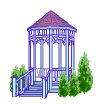 |
|
| MSO | |
 |
|
| MSO | |
| Various kinds of go events, including congresses and go camps, are held all over Europe every summer. Typically, they combine go with a vacation, lasting for one or two weeks, and the whole family attends. There are not many events like the typical Japanese go seminar, which has a packed schedule from morning to night. Rather, they are free and easy; each participant enjoys himself or herself in their own way, at their own pace. Of course, if it weren't like this, a long event would be too stifling for both organizers and participants. | |
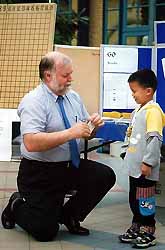 |
|
This year the event that wrapped up the summer schedule was the Mind Sports Olympiad (MSO), held for ten days in mid-August. I attended it. As the name indicates, it's a festival of mind games. Many traditional games are included, starting with chess, of course, but there are also East Asian games like go and shogi, "owara" from Africa, with its 4,000 years of history, newly invented games, computer games, etc. The grand total is impressive: 120 different games! Anyone can participate, from beginner to professional, and almost all the games had cash prizes. In go, there was fast go, pair go, 9x9 and 13x13, an open tournament that was the main event, and a children's tournament -- all with cash prizes. Just for reference, in the main tournament, which involved six games played over three days, the first prize was 2,000 pounds (about 350,000 yen). Tournaments with prize money are common overseas, but this prize is in the top bracket. This makes the MSO quite attractive to the top European amateurs -- if you can win a prize, you'll cover your travel and accommodation expenses and still have something left over. That accounted for the presence of some overseas players at the MSO. One interesting point, though, is that there seems to be no direct connection between a large prize and an increase in the number of competitors. Tournaments organized by the BGA usually draw a field of about 100, but there were only 38 players in the main tournament. The truth probably is that only a handful of top players can hope to earn prize money, so the average tournament player is indifferent. |
|
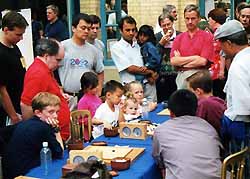 |
|
The person who attracted all the attention this year was a six-year-old prodigy from Guilin, Liao Xingwen. He learnt go at the age of five and is now 3-dan. You can see him improving with each game he plays. This is hard for adults to take! In the professional world one occasionally hears of players who were this strong at his age, but when he was five Liao became a live-in disciple for go training. This was Liao's own idea and he had to overcome the opposition of his parents and teachers. He's obviously no ordinary kid! For a five-year-old to leave his parents' home for the sake of go . . . I myself was a live-in disciple from 12 to over 20, but this staggers my imagination. He's no ordinary kid. When someone asked him what he wanted to be when he grew up, he answered: "A go professional." Why do you like go? "I just like it." Why? "What do you mean, why?" |
|
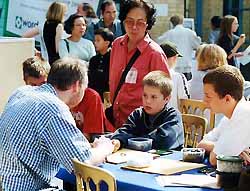 |
|
| My main concern at the MSO was the
children's tournament at the weekend. By
coincidence, there was a children's chess
tournament on the same day. Can you guess
the numbers in each? 12 in the go tournament. In the chess tournament? 900! That's not counting parents and brothers and sisters who came along to cheer players on. There was an electric atmosphere. In chess, there were championships for each age from five up, with awards for the winners in each class. There was a little girl who played with a baby bottle in her mouth. I was overwhelmed by the numbers. Maybe it was a kind of culture shock. That's what go is going to be like in the 21st century. We're going to bring it about! That's the burning ambition of my friends in the BGA and me. |
|
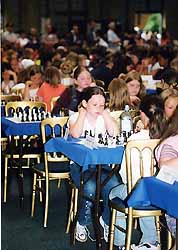 |
|